The global blue cheese market size was valued at $1.5 billion in 2022, and is projected to reach $2.2 billion by 2032, growing at a CAGR of 4.3% from 2023 to 2032.
Blue cheese is a type of cheese characterized by its blue or green veins of mold. Blue cheese can have a creamy or crumbly texture and is aged in caves or controlled environments to allow the mold to develop. It is used in various culinary applications, such as salads, dressings, and cheese platters, and pairs well with fruits and certain wines. The blue cheese market refers to the commercial trade and consumption of blue cheese, a type of cheese known for its distinctive blue or green veins of mold. It encompasses the production, distribution, sales, and consumption of blue cheese products worldwide.
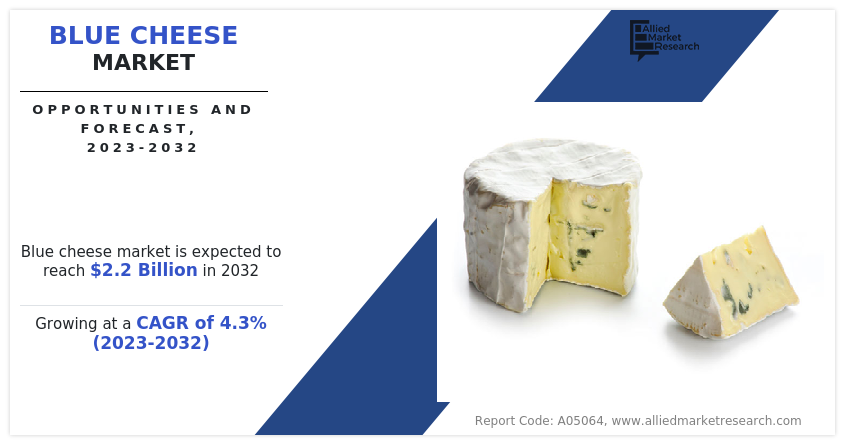
The blue cheese market is experiencing significant growth and offers lucrative business opportunities for cheese producers. Several key factors are driving this growth, along with emerging industry trends, challenges, and potential avenues for expansion. One of the primary growth drivers is the evolving consumer preferences. As tastes and culinary experiences become more diverse, there is a growing demand for unique and bold flavors like those found in blue cheese.
Furthermore, the versatility of blue cheese presents significant opportunities. In terms of industry trends, a focus on health and wellness has influenced the blue cheese market. Despite its strong flavor, blue cheese contains essential nutrients like calcium and protein. This nutritional profile positions it as a healthier option within the cheese category, appealing to health-conscious consumers. The rise of online retail and e-commerce has also played a crucial role in the market's growth. The convenience and accessibility of online platforms have enabled blue cheese producers to reach a wider customer base. Direct-to-consumer sales and online grocery platforms have become popular channels for blue cheese distribution, offering convenience and global market access.
However, the blue cheese market does face some challenges. Intense competition from other cheese varieties, both domestic and international, poses a threat. To stay ahead, producers need to differentiate their products and emphasize the unique qualities of blue cheese. Seasonality and perishability are additional challenges for the market. Blue cheese production is influenced by seasonal factors, and its shelf life is relatively shorter compared to some other cheese varieties. Effective supply chain management and inventory control are essential to ensure product availability and freshness.
Despite these challenges, there are numerous business opportunities in the blue cheese market. Product expansion and innovation, such as introducing new flavors or convenient snacking options, can attract consumers and create excitement. Exploring new geographic markets and expanding distribution networks are other avenues for growth. Collaborating with restaurants, hotels, and food service establishments can also help increase brand visibility and tap into new customer segments. In conclusion, the blue cheese market is witnessing substantial growth driven by evolving consumer preferences, the popularity of gourmet foods, and its culinary versatility. To capitalize on the market's potential, businesses should stay attuned to emerging trends, overcome challenges, and seize the available opportunities for product expansion, market expansion, and strategic partnerships.
The blue cheese market forecast is segmented on the basis of type, source, texture, distribution channel, and region. By type, the market is classified into gorgonzola, castello double crème blue, roquefort, stilton, and castello traditional danish blue. As per source, it is classified into sheep’s milk, cow’s milk, and goat’s milk. According to texture, the market is classified into hard blue cheese and soft blue cheese. Depending on distribution channel, it is classified into online retail, specialty stores, supermarket/hypermarket, and others. Region-wise, it is analyzed across North America (U.S., Canada, Mexico), Europe (UK, Germany, France, Italy, Spain, and Rest of Europe), Asia-Pacific (China, India, Japan, South Korea, Australia, and Rest of Asia-Pacific), and LAMEA (Brazil, Argentina, South Africa, KSA, and Rest of LAMEA).
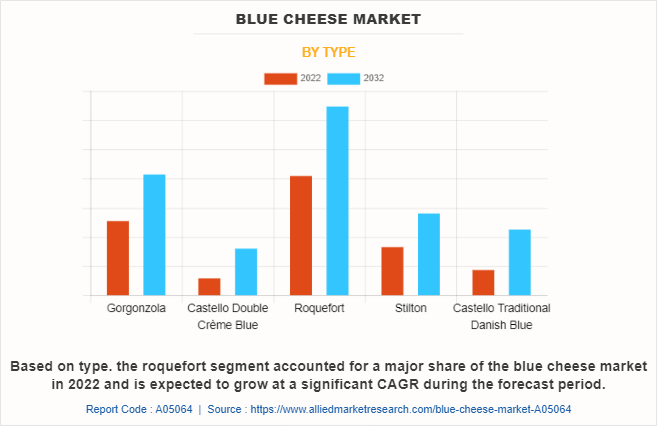
By type, the market is classified into gorgonzola, castello double crème blue, roquefort, stilton, and castello traditional danish blue. The Roquefort segment accounted for a major blue cheese market Share in the market in 2022 and is expected to grow at a significant CAGR during the forecast period. The Roquefort sector commands a substantial portion of the blue cheese market owing to its esteemed standing and unparalleled manufacturing methodology. Roquefort cheese is exclusively crafted in the Roquefort-sur-Soulzon locale in France, renowned for its limestone caverns that offer ideal circumstances for the growth of Penicillium mold, thereby giving rise to the remarkable aromas and textures synonymous with Roquefort cheese.
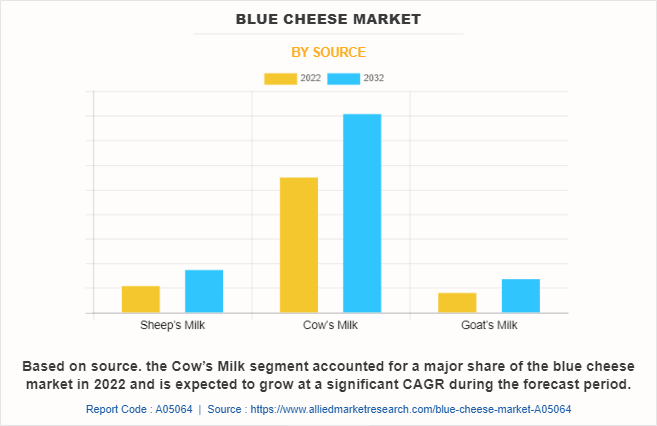
By source, the market is classified into sheep’s milk, cow’s milk, and goat’s milk. The cow’s milk segment accounted for a major share of the blue cheese market in 2022 and is expected to grow at a significant CAGR during the forecast period. The surge in demand for blue cheeses derived from bovine milk is witnessing an upward trajectory in the blue cheese industry owing to multiple factors. One prominent catalyst is the ubiquitous presence and widespread accessibility of cow's milk, rendering it a favored option among numerous consumers. Moreover, the inherent attributes of cow's milk, characterized by its velvety texture and subtle taste profile, greatly enhance its suitability for the production of blue cheese.
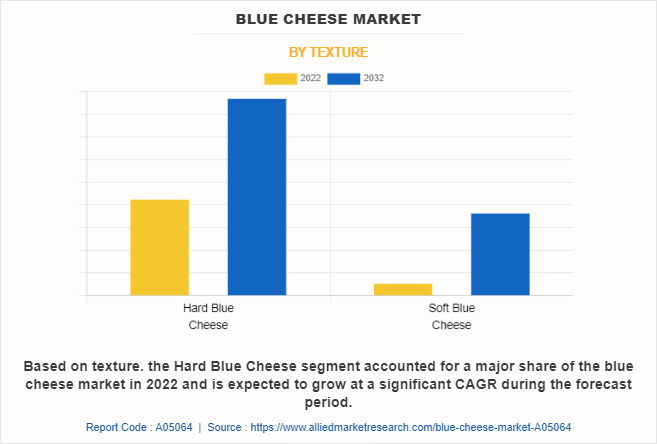
By texture, the market is classified into hard blue cheese and soft blue cheese. The hard blue cheese segment accounted for a major share of the blue cheese market in 2022 and is expected to grow at a significant CAGR during the forecast period. The demand for hard blue cheese is witnessing growth in the blue cheese market due to the increasing consumer preference for artisanal and gourmet cheeses. Hard blue cheese, with its firm and crumbly texture, appeals to cheese enthusiasts looking for unique and high-quality options. Its distinct blue veins and bold flavor profile contribute to its rising popularity.
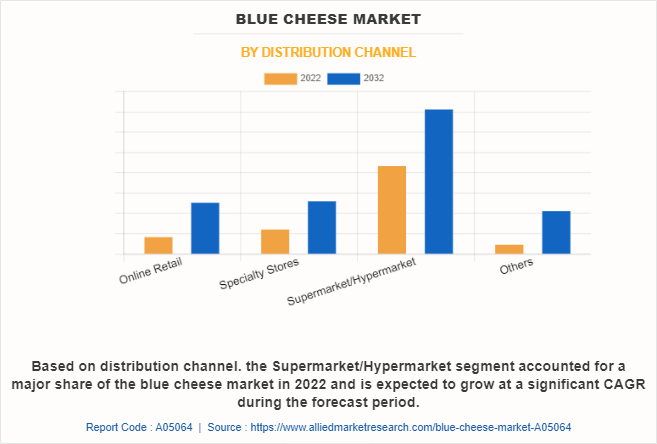
By distribution channel, the market is classified into online retail, specialty stores, supermarket/hypermarket, and others. The supermarket/hypermarket segment accounted for a major share of the blue cheese market in 2022 and is expected to grow at a significant CAGR during the forecast period. The demand for supermarkets and hypermarkets in the blue cheese market is experiencing notable growth due to various factors. One significant factor is the changing consumer behavior and the increasing preference for convenience. Supermarkets and hypermarkets offer a convenient one-stop shopping experience, allowing customers to find a diverse range of blue cheese options alongside their regular grocery purchases.
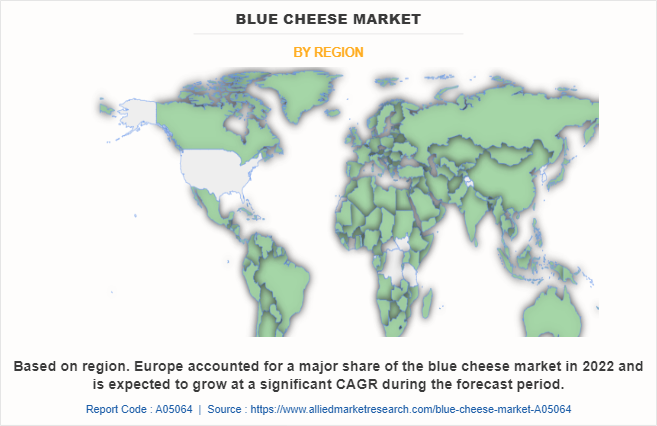
Region-wise, it is analyzed across North America (U.S., Canada, Mexico), Europe (UK, Germany, France, Italy, Spain, and Rest of Europe), Asia-Pacific (China, India, Japan, South Korea, Australia, and Rest of Asia-Pacific), and LAMEA (Brazil, Argentina, South Africa, KSA, and Rest of LAMEA). Europe has emerged as a formidable force in the blue cheese industry, securing a notable portion of the market. This achievement can be ascribed to Europe's opulent legacy in cheese craftsmanship, robust gastronomic customs, and the existence of esteemed nations specializing in blue cheese production, including France, Italy, and the United Kingdom. Such factors converge to amplify the region's eminence within the blue cheese market demand landscape.
The major players operating in the market focus on key market strategies, such as mergers, product launches, acquisitions, collaborations, and partnerships. They have been also focusing on strengthening their market reach to maintain their goodwill in the ever-competitive market. Some of the key players in the blue cheese market report include Rogue Creamery, The Exmoor Blue Cheese Company, The Kraft Heinz Company, Organic Valley Family of Farms, Maytag Dairy Farms, Blue Cow Cheese Company, Cashel Blue Cheese, The Kroger Co., Arla Foods amba, and Bel.
Key Benefits For Stakeholders
- This report provides a quantitative analysis of the market segments, current trends, estimations, and dynamics of the blue cheese market analysis from 2022 to 2032 to identify the prevailing blue cheese market opportunities.
- The market research is offered along with information related to key drivers, restraints, and opportunities.
- Porter's five forces analysis highlights the potency of buyers and suppliers to enable stakeholders make profit-oriented business decisions and strengthen their supplier-buyer network.
- In-depth analysis of the blue cheese market segmentation assists to determine the prevailing market opportunities.
- Major countries in each region are mapped according to their revenue contribution to the global market.
- Market player positioning facilitates benchmarking and provides a clear understanding of the present position of the market players.
- The report includes the analysis of the regional as well as global blue cheese market trends, key players, market segments, application areas, and blue cheese market growth strategies.
Blue Cheese Market Report Highlights
| Aspects | Details |
| Market Size By 2032 | USD 2.2 billion |
| Growth Rate | CAGR of 4.3% |
| Forecast period | 2022 - 2032 |
| Report Pages | 433 |
| By Texture |
|
| By Type |
|
| By Distribution Channel |
|
| By Source |
|
| By Region |
|
| Key Market Players | AgCertain Industries, Inc., European Foods Marketplace, The Kroger Co., Cashel Farmhouse Cheesemakers, The Kraft Heinz Company, Arla Foods amba, Climax Foods Inc., Savencia SA, Saputo Inc., Organic Valley Family of Farms. |
Analyst Review
According to the insights of the CXOs, the global blue cheese market is expected to witness robust growth during the forecast period. This can be attributed to the increasing fascination with gourmet and handcrafted foods. The rising interest in artisanal and premium food products has emerged as a major driver behind the expansion of the blue cheese market. Consumers are progressively inclined towards top-notch, skillfully made goods that offer distinctive flavors and characteristics. This shift in preferences has elevated the status of blue cheese as a desirable choice among food enthusiasts and connoisseurs. The appeal of blue cheese lies in its meticulous craftsmanship and distinct flavor profile. Traditional production methods are often employed, with careful attention given to aging and maturation. This artisanal approach yields cheeses with exceptional depth, complexity, and richness. The intricate blue veins running through the cheese create a visually captivating appearance.
Nonetheless, blue cheese has a relatively limited shelf life in comparison to other cheese varieties. Its unique aging process and the presence of mold can result in spoilage if not handled and stored appropriately. This short shelf life presents challenges for producers and retailers in terms of inventory management, waste reduction, and ensuring product freshness.
The global blue cheese market size was valued at $1.5 billion in 2022, and is projected to reach $2.2 billion by 2032
The global Blue Cheese market is projected to grow at a compound annual growth rate of
Some of the key players in the blue cheese market report include Rogue Creamery, The Exmoor Blue Cheese Company, The Kraft Heinz Company, Organic Valley Family of Farms, Maytag Dairy Farms, Blue Cow Cheese Company, Cashel Blue Cheese, The Kroger Co., Arla Foods amba, and Bel.
Europe has emerged as a formidable force in the blue cheese industry, securing a notable portion of the market.
Growing interest in gourmet and artisanal foods, An increase in demand for nutrients rich food, Increasing availability and accessibility
Loading Table Of Content...
Loading Research Methodology...



